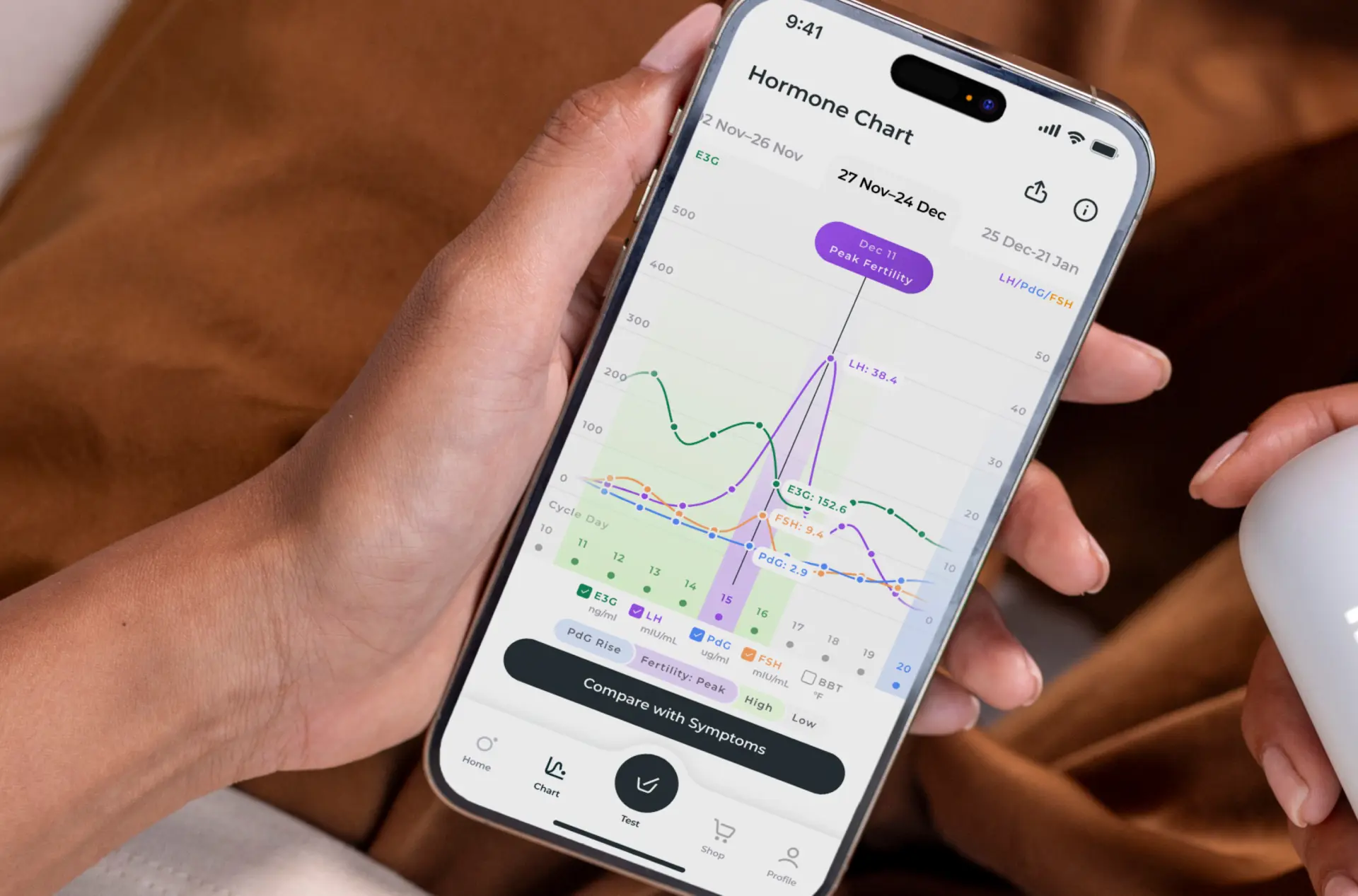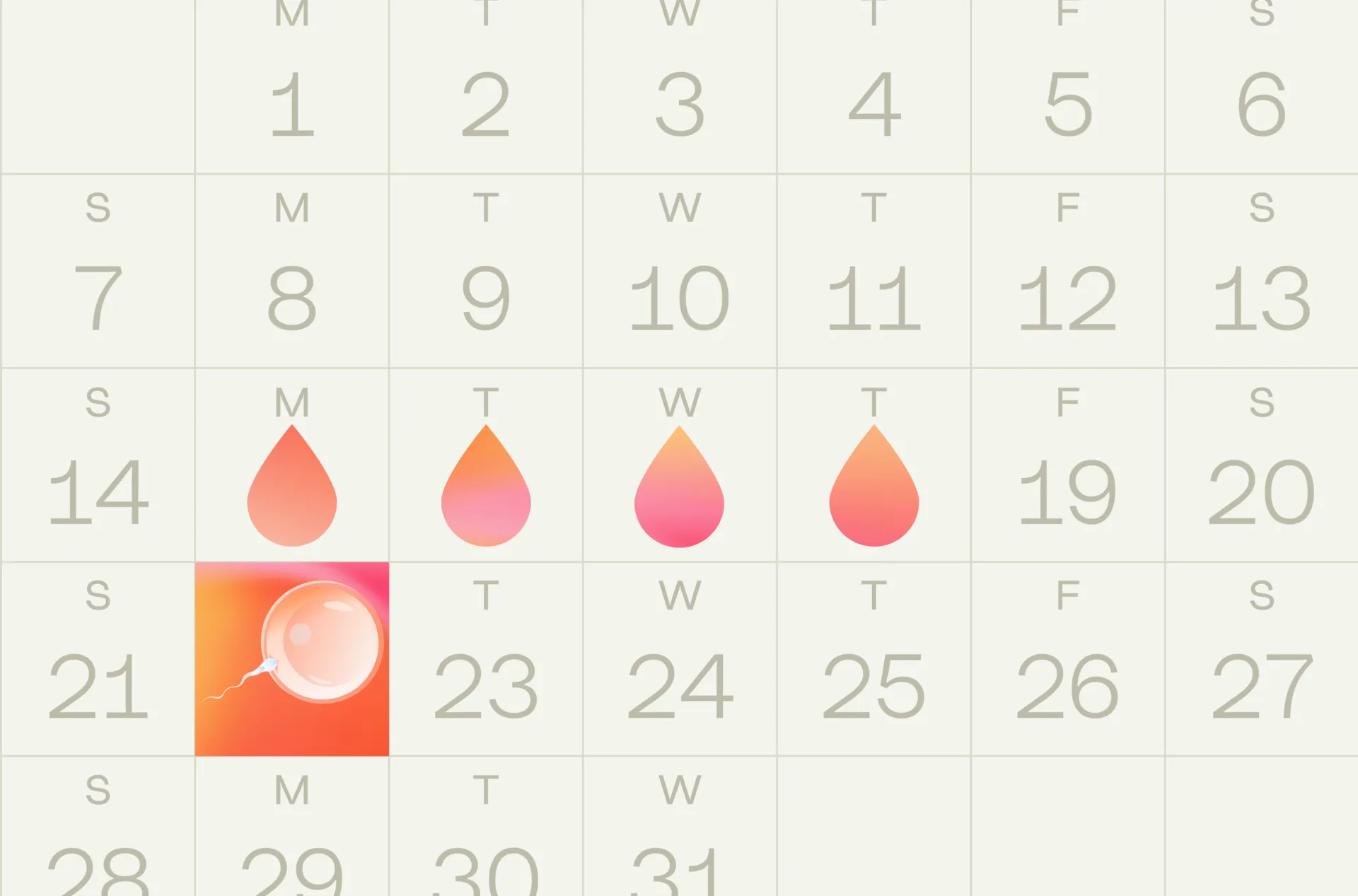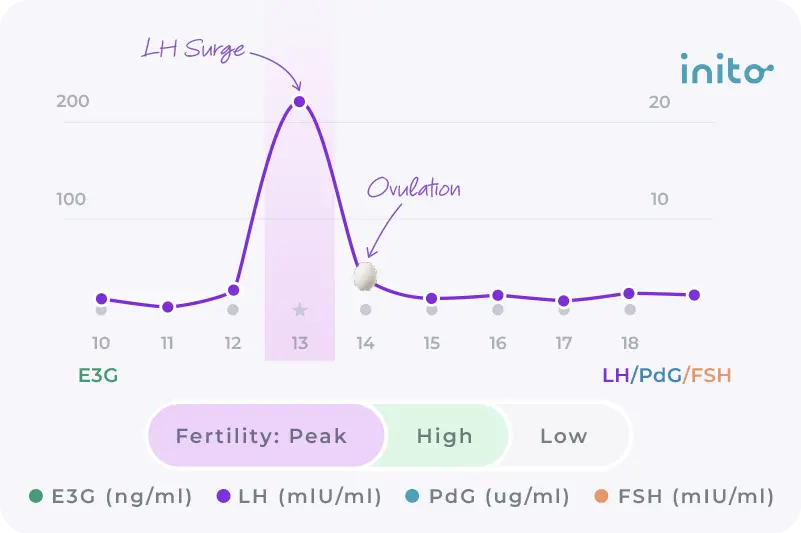Content table
Worried about high FSH levels? Feeling a little lost?
Luckily, we’ve got good news! If you are trying to get pregnant, there are ways to tell if you need help.
Your ovarian reserve is an estimate of how many eggs you have left, a great indicator of female fertility. Measuring your FSH level is the easiest way to check your ovarian reserve. Having a high level means you might be running low on healthy eggs.
Read on to learn more about FSH. How does it work? Why are your FSH levels high? Can you get pregnant with high FSH? Here’s what you need to know.
What is follicle-stimulating hormone (FSH)?
FSH, or follicle stimulating hormone, is made by the pituitary gland. FSH stimulates the growth of eggs in the ovaries and helps regulate the menstrual cycle.
Women are born with all the eggs they’ll ever need, unlike men, who can produce sperm forever. These eggs hang out in your ovaries within the follicles. These follicles mature one at a time each menstrual cycle.
Shortly after your period, a surge of FSH stimulates your ovaries. The hormone tells several eggs to develop in fluid-filled pouches called antral follicles. The biggest follicle usually matures first.
During ovulation, it releases a mature egg into the fallopian tube. All the other follicles usually die. Though sometimes two or more eggs develop, resulting in more than one baby.
When your ovaries don’t produce enough eggs, your FSH levels can go up. This can be stressful and anxiety-inducing for many women, but it doesn’t have to be. You can still get pregnant even if your FSH levels are high.
Why is FSH important?
Males and females both need Follicle-Stimulating Hormone to reproduce. FSH testing gives you a lot of good info about your fertility. You can use it to figure out your chances of getting pregnant by telling you how many good years of reproductive health you have left.
In females, FSH is necessary for the menstrual cycle and fertility. It makes the ovaries produce estrogen. It also makes ovarian follicles grow and produce eggs. Without FSH, the follicles would not mature and ovulation would not occur, leading to infertility.
In men, FSH stimulates sperm production in the testes. Along with luteinizing hormone (LH), it controls testosterone production. Male sexual characteristics and fertility depend on this. Without FSH, the testes wouldn’t make sperm, leading to infertility.
It’s not just for reproduction; FSH plays a role in bone health and metabolism, too. The hormone keeps bones strong by balancing calcium and phosphorus. In addition, it helps regulate cholesterol levels and fat metabolism.
Now that you know the importance of this vital hormone, let’s understand how FSH helps determine your egg count along with other hormones.
How FSH, AMH, and AFC determine your egg count?
AMH, FSH, and AFC all test ovarian reserves (how many healthy eggs a woman has left). You can’t get an exact egg count with these tests, but they’re pretty accurate. Let’s look at how they can help you.
- Follicle-stimulating hormone (FSH) is a hormone that stimulates the production of follicles in the ovaries of women. These follicles mature to form one dominant follicle which releases the egg. High levels indicate the follicles are less in number whereas low levels may be too low to stimulate the follicles.
- Anti-Mullerian Hormone (AMH) is a hormone produced by developing ovarian follicles. High AMH levels suggest a high egg supply. Low levels might be a sign that your ovaries aren’t working right. AMH testing can help doctors to evaluate your fertility by providing a rough estimate of the number of eggs remaining in your body.
- Antral Follicle Counts (AFC) describe the number of small follicles in the ovaries. It’s easy to get this count with an ultrasound. The AFC tells you how many follicles a woman has in her ovaries, so you can predict her fertility. As a measure of follicle count, it’s more accurate than AMH (Anti-Mullerian Hormone), which is based on hormones. Together, they give you the most accurate results.
Of these tests, the FSH test is the one you’ll hear about the most. You can get a blood test done. AMH and AFC give you valuable info about what your FSH levels mean.
What do your FSH and AMH levels tell you?
- Having low AMH levels along with a high FSH level can indicate that your egg count is deteriorating. This means that you could have fertility problems.
- A normal or low FSH and a higher AMH can improve your chances of getting pregnant. However, you would require your FSH levels to be normal to stimulate the follicles.
So how can you alter your FSH levels to boost your fertility?
Can you reduce FSH levels?
It’s hard to suppress FSH levels directly. FSH levels can be high due to certain medical conditions or lifestyle choices. You can sometimes solve your infertility by treating the underlying issue.
Causes of High FSH
- Age is a normal cause of high FSH levels in women. As a woman gets closer to menopause, her ovarian reserve drops. Eventually, the remaining follicles stop responding to hormones. The pituitary gland tries to make up for this by raising FSH levels.
- Primary Ovarian Insufficiency (POI) is when your ovaries stop working before you turn 40. It’s also called Premature Ovarian Failure (POF). Genetics, illness, or trauma can cause it. The pituitary gland tries to make your ovaries work by boosting your FSH level.
- Polycystic Ovary Syndrome (PCOS) is a hormonal disorder. It’s the leading cause of female infertility. PCOS causes enlarged ovaries with lots of cysts. As a result of disrupted hormone balance, women with PCOS may have elevated FSH and LH levels.
- Turner syndrome is a genetic disorder that affects women. It’s common for women with Turner syndrome to experience premature ovarian failure. This will give them a high FSH level.
- Cancer treatment can damage your reproductive system and cause high FSH levels. This is especially true if you’re fighting cancer in your reproductive system.
- Medications like gonadotropin-releasing hormone (GnRH) agonists can cause high FSH.
- Surgery on the ovaries can cause high FSH levels by damaging your remaining follicles.
Is it really enough to reduce FSH levels?
No, lowering FSH levels is not enough to improve fertility by itself.
FSH levels can be a good indicator of fertility. But simply lowering FSH levels won’t fix the underlying problem.
Low FSH can also cause infertility. As mentioned above, FSH is critical for the development of sperm and eggs. They won’t mature properly if there’s not enough FSH.
Management of high FSH
Want to improve your chances of getting pregnant? It’s important to figure out what’s causing your high FSH. Here are some easy ways to manage your FSH:
- Lifestyle changes, including:
Dietary changes can help treat issues such as PCOS. Studies say that switching to a ketogenic or Mediterranean diet can improve fertility for some women.
Exercise is vital for staying healthy and fighting aging. Your immune system gets weaker when you’re not active enough. You’re also more likely to get overweight and have hormonal problems if you don’t exercise.
Sleep quality and length are important for hormone regulation. There are some biological processes that can only happen while you’re sleeping.
While the above advice may not help reduce your FSH levels directly, lifestyle changes can improve your overall health and push your body to ovulate.
- Hormone replacement therapy (HRT) involves taking estrogen and progesterone to balance hormones. You can reduce FSH levels with HRT and ease menopause symptoms.
- Acupuncture is a form of traditional Chinese medicine, and it has long been used to boost fertility. Today, there is evidence that acupuncture may help regulate hormone levels.
- Nutritional supplements like DHEA, CoQ10, and Omega-3 fatty acids may help lower FSH levels.
- Psychological support can help you overcome mental health challenges related to infertility. Prioritize talking to a mental health professional or a support group. Lowering stress makes you healthier in every way and keeps your hormones regulated.
- Surgical intervention may be what it takes to overcome conditions like endometriosis or ovarian cysts. These sorts of conditions can cause high FSH levels.
- Regular hormone testing can help you track your FSH levels. Testing kits can help you understand your patterns and figure out your needs.
The most effective way to lower FSH is to fix whatever is causing it. Talk to a board-certified reproductive endocrinologist or other reproductive doctor to explore your fertility options.
You are not alone!
A wonderful thing about the modern era is how easily women can share their stories.
One of the celebrities most outspoken about infertility is Elisabeth Röhm. You probably recognize her for her role as Serena on NBC’s Law & Order. She wrote an entire book about her struggle to get pregnant with her daughter, Easton. The memoir is called, “Baby Steps: Having the Child I Always Wanted (Just not as I Expected).”
“I found out I had issues, and I acted very quickly,” she said in an interview about her book. “I was still 34, not 38 or 40.”
Röhm tells young women to check their ovarian reserves before turning 30. The sooner you know you’ll have a problem conceiving, the more options you have. And the better your chances of having a healthy baby from your own eggs!
So, whether you have figured out your ovarian reserve or not, know that you are not alone. Focus on eating a healthy diet, exercising regularly, and getting adequate rest to boost your overall health and fertility.
If you’re worried about taking the first step, use a fertility monitor like Inito to track your hormone levels daily. With Inito, you can measure your four fertility hormones – FSH, estrogen, LH, and progesterone metabolite PdG to understand your cycles better.
Takeaways
- If you’re worried about your fertility, it’s not enough to just lower FSH levels. You have to figure out what’s causing the high FSH and fix that.
- FSH is a hormone produced by the pituitary gland. It helps stimulate the growth of immature eggs in the ovaries.
- High FSH levels can be a sign of a low ovarian reserve.
- Ovarian reserve is the number of immature eggs left in your ovaries. It’s an important measure of female fertility.
- FSH testing offers valuable info about your fertility potential. It can help you calculate your chances of conceiving naturally or needing fertility treatment.
- FSH, AMH, and AFC are all tests used to assess ovarian reserves and estimate how many healthy eggs a woman still has.
- Lifestyle changes can help improve fertility potential and reduce high FSH levels.
- Certain medical conditions can cause high FSH levels and require medical intervention.
- It’s never too soon to check your fertility. A handful of simple tests can tell you your egg count
- These values can tell your fertility doctor if you’ll need treatment to get pregnant.
Was this article helpful?
- Selective reduction of elevated FSH levels in infertile men by pulsatile LHRH treatment
- Effects of suppression of follicle-stimulating hormone secretion on bone resorption markers in postmenopausal women
- Reduced FSH and LH action: implications for medically assisted reproduction
- Reduction in FSH Throughout the Menstrual Cycle After Omega-3 Fatty Acid Supplementation in Young Normal Weight but not Obese Women
- Successful pregnancy despite advanced age and elevated serum follicle stimulating hormone levels–a case report
- The use of coenzyme Q10 and DHEA during IUI and IVF cycles in patients with decreased ovarian reserve
- Unifying theory of adult resting follicle recruitment and fetal oocyte arrest – ScienceDirect
- Elisabeth Röhm of “NCIS” and “Law & Order” Discusses Her IVF Journey | NYMetroParents
- Efficacy of Follicle-Stimulating Hormone (FSH) Alone, FSH + Luteinizing Hormone, Human Menopausal Gonadotropin or FSH + Human Chorionic Gonadotropin on Assisted Reproductive Technology Outcomes in the “Personalized” Medicine Era: A Meta-analysis – PMC
- Polycystic ovary syndrome: etiology, pathogenesis and diagnosis
- Acupuncture Treatment for Fertility – PMC












